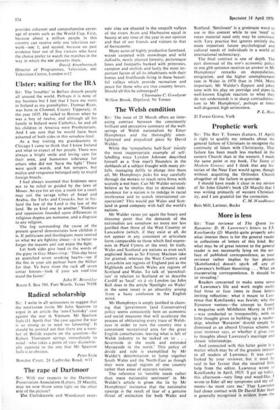The Welsh condition
Sir: The issue of 28 March offers an inter- esting contrast between the consistently brilliant and perceptive summary of the well- springs of Welsh nationalism by Emyr Humphreys and the thoroughly unen- lightened and prejudiced piece by David Walder.
While the `sympathetic half-Scot' (surely the most inappropriate example of self- labelling since Lyndon Johnson described himself as a 'free man') flounders in the sloblands of a subject fraught with many pit- falls, managing deftly to plunge into them all, Mr Humphreys picks his way carefully through the morass to reach terra firma with scarcely a wet boot. Can Mr Walder seriously believe as he implies that to demand inde- pendence for a nation is to indulge in racial intolerance and to scotch international co- operation? This would put Wales and Scot- land in good company with half the world's nations.
Mr Walder raises yet again the hoary and tiresome point that the demands of the nationalists are somehow no more nor less justified than those of the West Country or Lancashire (which, if they exist at all, do not appear in any consistent or articulate form comparable to those which find expres- sion in Plaid Cymru or the SNP). In truth, Wales and Scotland are nations as even such anglicised Scots as Sir Fitzroy Maclean take for granted, whereas the West Country and Lancashire are regions of England just as the Highlands and South Wales are regions of Scotland and Wales. To talk of 'parochial- ism' in relation to Scotland of to describe Cardiff as 'local' vis a vis London (as John Bull does in the article 'Spotlight on Wales' in the same issue) is an absurdity arising from a basic confusion in the English mind.
Mr Humphreys is amply justified in claim- ing that 'government [and Conservative] policy seems consistently bent on economic and social measures that will accelerate the process of obliterating every trace of Welsh- ness in order to turn the country into a convenient recreational area for the great English conurbations, leaving what is left of Welsh industry to be tacked on to . . Severnside in the south and extended Merseyside in the north.' This policy of divide and rule is exemplified by Mr Walder's determination to lump together South Wales and the North-East as though they were equal regions of one country rather than areas of separate nations.
The reference to 'sensible needs rather than mere nationalist sentiment' in Mr Walder's article is given the lie by Mr Humphreys' insistence that the nationalist upsurge is the result of fear of a genuine threat of extinction for both Wales and Scotland. 'Sentiment' is a grotesque word to use in this context while to use 'need' to mean material need only may be consistent with Tory practice but ignores entirely the more important future psychological and cultural needs of individuals in a world of international technocracy.
The final contrast is one of depth. The curt dismissal of the SNP'S economic policy in one glib sentence receives an answer in Mr Humphreys' remarks on depopulation, emigration, and the higher unemployment rate in Wales in 1970 than in 1964. More important, Mr Walder's flippant and jokey tone with his play on porridge and pipes (a well-known English reaction to what they do not understand) is in sharp contradistinc- tion to Mr Humphreys', perhaps at times well disguised, high seriousness.






































 Previous page
Previous page